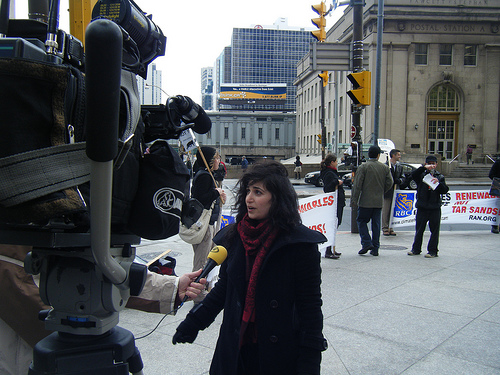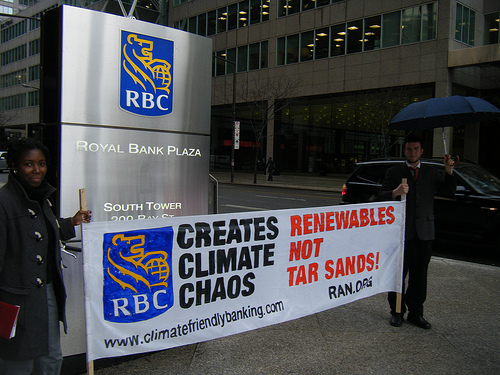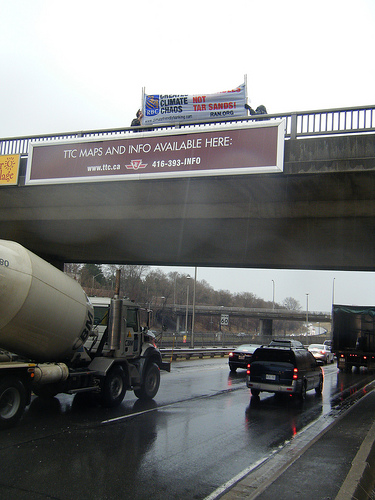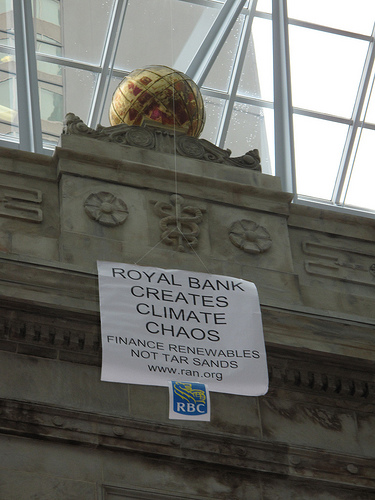Five actions in one day in downtown Toronto? No foolin!
Today Rainforest Action Network activists kicked Fossil Fools Day off with a bang, dropping banners off of a highway, greeting over 4,000 cars stuck in deadlock traffic over a period of two hours. From bridges, we broadcast messages about Royal Bank of Canada (RBC)’s financing of the Canadian Tar Sands from our makeshift Pirate Radio station. Our banners read “Pirate Radio 89.9 FM Tune in now” and “Royal Bank creates climate chaos. Renewables not tar sands.” The pouring rain didn’t block our view of car after car reaching for the radio dial as they drove under us.

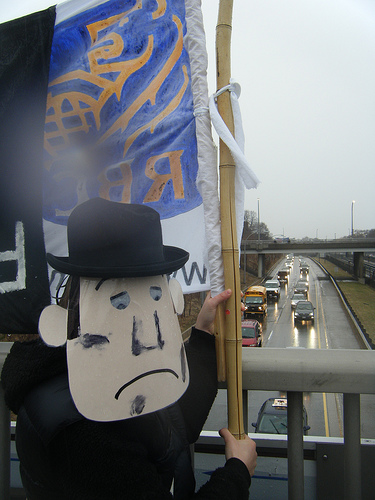 Listen to the audio broadcast we played here!
Listen to the audio broadcast we played here!
We moved on to RBC’s headquarters downtown, and throughout the day were joined by over 30 activists filtering in and out for the festivities.
We began by dressing up and impersonated bank employees. About 16 of us rode elevators for up to two more hours, chatting up other RBC personel – “Hey, on my way to work today I heard about how RBC is financing the destruction of Native territories in Alberta, causing people cancer and polluting the water! Tar Sands are the world’s dirtiest oil. Did you know that? I had no idea! I’m telling my manager right away!”

Meanwhile, outside the HQ, several more of us leafleted and held banners reading “RBC Creates poisoned water in our community,” “Renewables not tar sands” and “RBC: financing cancer and toxic sludge.”
Back inside, a lone Torontan walked inside the main office with a beautiful bouquet of balloons. I don’t know where he got the idea to release them in the atrium, or how a banner reading “ROYAL BANK CREATES CLIMATE CHAOS” got attached….I also don’t know how they’re gonna get it down. We have undercover footage of the prank here: [youtube rJ4np3YSAUs]
Later that evening, dozens of activists reconvened outside RBC headquarters alongside “Tarbie,” an oil-soaked version of RBC’s prized mascot “Arbie” who explained to passersby that he and RBC are helping finance one of the fastest growing sources of water pollution and greenhouse gas emissions on the planet, and how they conflict with the financial giant’s PR promises to promote clean water.
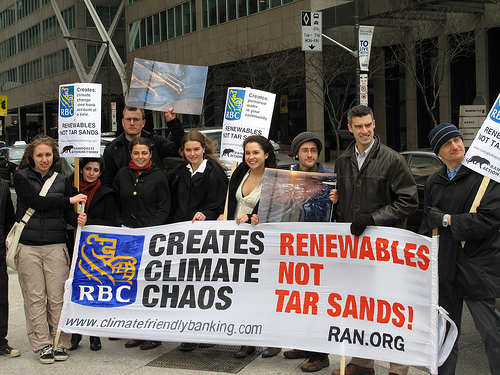
With more than $1 trillion in assets, the financing decisions of RBC greatly impact Canada’s $1.3 trillion economy. When RBC finances tar sands expansion, it locks in a polluting infrastructure that will have permanent negative impacts on regional water and air quality and accelerate global warming. RBC last year launched a new Blue Water Project, a PR initiative “committed to donating $50 million toward global fresh water initiatives over the next ten years.” In contrast to the $3 million dollars actually released in water quality improvement donations under the program in the first year, RBC financed an estimated minimum of $641 million for oil and gas companies operating in the Alberta tar sands, one of Canada’s largest sources of water pollution.
“If RBC is serious about supporting clean water,” said Melina Laboucan-Massimo earlier this year, member of Lubicon Cree Nation, a community fighting a TransCanada pipeline to the tar sands through their territory; “Why are they financing projects that are contaminating the lakes and rivers around my community?”
Extraction of oil from the Alberta tar sands is also a major threat to climate change, resulting in three times more global warming-causing greenhouse gas emissions than conventional oil. Tar sands development is turning once pristine stretches of forest into desolate, post-apocalyptic landscapes and producing toxic pollution that is harmful to the health and quality of life of the region’s First Nations and other frontline communities.
“RBC’s investments in tar sands are having serious consequences for people living in nearby communities through elevated rates of cancer and polluted water supplies,” said Lionel Lapine at RBC’s Annual General Shareholders meeting, member of the Athabasca Chipewyan First Nation, a community directly downstream from tar sands developments. “RBC needs to start considering the price of their investments in human suffering, not just in dollars spent.”
RBC has been greeted with similar protest today in five other Canadian cities, expressing nationwide discontent with RBC’s policies.
Check out more photos here.
